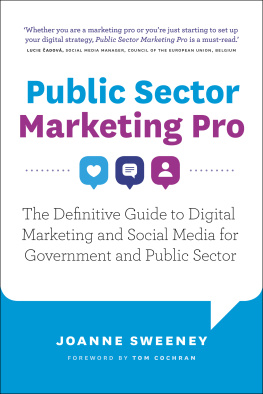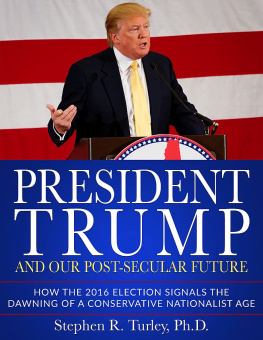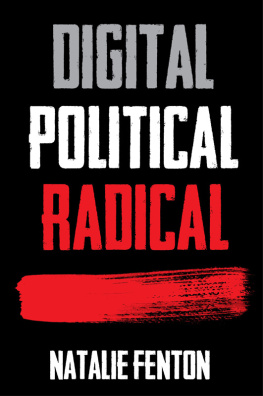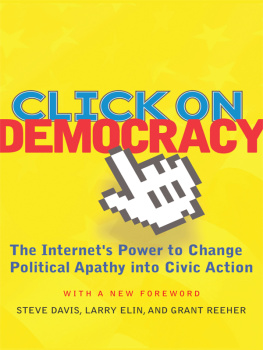Copyright 2019 by the President and Fellows of Harvard College
All rights reserved
Cover design: Graciela Galup
Cover art: Getty Images
978-0-674-97233-9 (hardcover : alk. paper)
978-0-674-24044-5 (EPUB)
978-0-674-24045-2 (MOBI)
978-0-674-24043-8 (PDF)
The Library of Congress has cataloged the printed edition as follows:
Names: Schradie, Jen, author.
Title: The revolution that wasnt : how digital activism favors conservatives / Jen Schradie.
Description: Cambridge, Massachusetts : Harvard University Press, 2019. | Includes bibliographical references and index.
Identifiers: LCCN 2018042809
Subjects: LCSH: Internet and activismNorth Carolina. | Internet and activismUnited States. | Political participationNorth CarolinaHistory21st century. | Digital mediaPolitical aspectsNorth Carolina. | Right and left (Political science)North CarolinaHistory21st century. | North CarolinaPolitics and government1951
Classification: LCC HN79.N8 I567 2019 | DDC 302.23 / 1dc23 LC record available at https://lccn.loc.gov/2018042809
For almost two decades, the internet has been hailed as a revolutionary leveling force that is reshaping activism, particularly following the rise of social media. In 2017 alone, one could find examples in several powerful hashtag protests. There was #MeToo, launched in the wake of a Hollywood sexual harassment scandal that would eventually topple celebrities and politicians alike well into 2018. There was #WomensMarch, which ignited some of the largest simultaneous mass protests the world had ever seen. Activism seemed cheap, accessible, fast, and open to all. With the right hashtag, it appeared that all it takes to start a movement is the right status update, and suddenly, a nobody from nowhere can change the world.
However, after having the playing field largely to itself for years, this celebratory narrative now finds itself competing with an increasingly sinister view of the internet. A murmur of dissent on digital platforms and politics grew into a roar following the election of President Trump. Platforms like Facebook and Twitter, once the darlings of digital democracy, were suddenly on the defensive for their role in promoting fake news. Concerns about privacy multiplied as revelations grew that some companies may be harvesting social media data to manipulate voters. Russias role was being heavily scrutinized. Harassment, particularly of women, seemed unstoppable. Terrorists were turning to social media to spread violent propaganda. Trolls, bots, and hackers were subjects of congressional hearings. And above it all was a growing fear that the internet was a thing beyond anyones control, that it had opened the door to an activism far darker and more destructive than once thought possible.
The earlier Edward Snowden revelations of the governments digital spying had put a crack in the utopian digital vision of the internet. But it had taken several years, and the shock election of Trump, for much of the Western world to wake up to the ways the internet could be used to stifle democratic movements. By early 2018, the battle for the soul of digital activism was in full swing. Young students took to social media to demand more protection from gun violence. Swarms of Twitter bots flew into action to shout them down online.
Good. Bad. Utopian. Dystopian. The impact of digital technologies on political activism has exploded into a global conversation, a furious debate over the role that platforms like Facebook, Twitter, and YouTube now play in giving voice to those previously unheard. While this may be new territory for many, it has been central to the questions that my research has explored over the past decade: Who is able and motivated to make use of these new digital tools? And how does this shape their activism?
The impetus to explore the intersection of digital media and activism is both personal and professional for me. It derives from my experiences on the ground with communication technologies and social movements, experiences that inspired me to want to push beyond breezy headlines about hashtag activism. In 1988, as an undergraduate at Duke University, I spent time in Central America, where the United States was waging a covert war against popular movements. In an effort to stop the American military intervention, local activists encouraged me and other North Americans to get the word out about what we had witnessed. And thousands of internationalists like me did just that. Back in this pre-internet age, I wrote articles for student and community publications. Others were doing everything from writing letters to the editor and in newsletters to speaking in church basements and universities.
Later, I embraced video as a way for local people to be able to tell their stories directly, rather than through intermediaries like me. I was hooked. The availability of VHS video seemed to be a revolutionary way for stories about the disenfranchised to reach a wider audience. While still a student at Duke University, I disseminated one copy of a video that the United Farmworkers had made to promote their California grape boycott in protest of the toxic chemicals that agribusinesses were using. I showed the video of farmworkers own voices (with the help of a celebrity voiceover) to different campus groups, classes, and administrators, eventually convincing the university to support their boycott.
After college, I stumbled into a career as a documentary filmmaker. I started modestly, wanting to get the stories out about injustices in the American Black Belt South. A friend and I made a documentary about a group of Black farmers and residents whose drinking water had been contaminated from a nearby factory. If I had known how much work went into making such a video, Im not sure I would have ever started. But I fell in love with the power of people being able to tell their own story. Yet it was still indirect and time-delayed.
I continued to do a variety of communication work for nonprofit groups, from producing videos and designing newsletters to making buttons and T-shirts. But video was my passion, even though time and gaining access to equipment remained big hurdles. I would often borrow cameras from schools and universities or take advantage of public access stations. These used to be some of the only ways that everyday people could use professional video-editing equipment and get their videos broadcast.
By the mid-to-late 1990s, digital video cameras and editing radically transformed shooting and editing film. I went into the Philippine jungle with a filmmaking partner to interview rebel guerillas for one of my documentaries. We were spared having to haul a large, analog video camera, let alone a 16mm camera with large reels of film, as we hiked at night to avoid government detection. In our case, two people were enough to shoot countless hours of footage and edit it on a Mac. By the time this film premiered in 1999, it felt like we were part of another media revolution. Even so, distribution of video itself had not changed. Social movement groups were launching their own websites, but I still had to distribute videos through touring, film festivals and public television.










